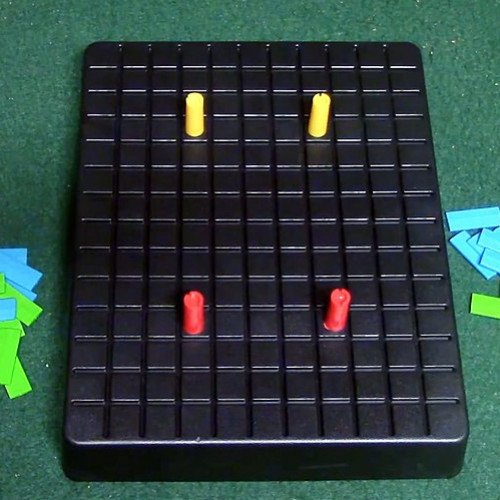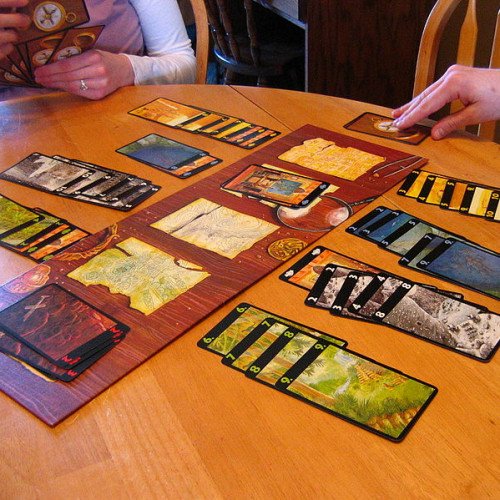BLOCKADE VS LOST CITIES

BLOCKADE
Blockade (also known as Cul-de-sac) is a strategy board game for two players with the motto "beat the barrier". It's played on a board with an 11x14 grid of spaces, barriers and 2 mobile playing pieces per player. The object of the game is to maneuver ones pieces around barriers and into the opponents starting spaces. The game is long out of production. Blockade was created by Philip Slater in 1975. In United States, it was published by Lakeside under the name Blockade. In France, Germany, Sweden, and United Kingdom the game was published by Lazy Days under the name Cul-de-sac (French, translation dead-end). The rules are simple, but it provides an interesting and deep game. Each player are given 2 pawns, 9 green walls (placed vertically), and 9 blue walls (placed horizontally). Pawns are placed on their starting locations on each of the four corners of the 11×14 board. First players' starting location is at [4,4] and [8,4], and the second players' is at [4,11] and [8,11]. The object of the game is for each player to get both their pawns to the starting locations of their opponent. The first to do so wins. On each turn, a player moves one pawn one or two spaces (horizontally, vertically, or any combination of the two) and places one wall anywhere on the board (useful for blocking off their opponent's move). Walls always cover two squares and must be placed according to their color (vertically or horizontally). Pawns may jump over other pawns that are blocking their path. Once players are out of walls, they keep moving pawns until one wins.
Statistics for this Xoptio

LOST CITIES
Lost Cities is a 60-card card game, designed in 1999 by game designer Reiner Knizia and published by several publishers. The objective of the game is to mount profitable expeditions to one or more of the five lost cities (the Himalayas, the Brazilian Rain Forest, the Desert Sands, the Ancient Volcanos and Neptune's Realm). The game was originally intended as a 2-player game, but rule variants have been contributed by fans to allow 1 or 2 further players, causing Reiner Knizia himself to later provide semi-official 4-player rules. Lost Cities is a fast-moving game, with players playing or discarding, and then replacing, a single card each turn. Cards represent progress on one of the five color-coded expeditions. Players must decide, during the course of the game, how many of these expeditions to actually embark upon. Card-play rules are quite straightforward, but because players can only move forward on an expedition (by playing cards which are higher-numbered than those already played), making the right choice in a given game situation can be quite difficult. An expedition that has been started will earn points according to how much progress has been made when the game ends, and after three rounds, the player with the highest total score wins the game. Each expedition that is started but not thoroughly charted incurs a negative point penalty (investment costs). Interaction between players is indirect, in that one cannot directly impact another player's expeditions. However, since players can draw from the common discard piles, they are free to make use of opposing discards. Additionally, since the available cards for a given expedition are finite, progress made by an opponent in a given color can lead to difficulty making progress in that same color. The game's board, while designed to supplement the theme, is optional and consists only of simple marked areas where players place discards. If Lost Cities had four expeditions instead of five, it could be played with a standard deck of playing cards. When doing so, the face cards would represent investment cards, with numbered cards two through ten serving as the expedition progress cards.